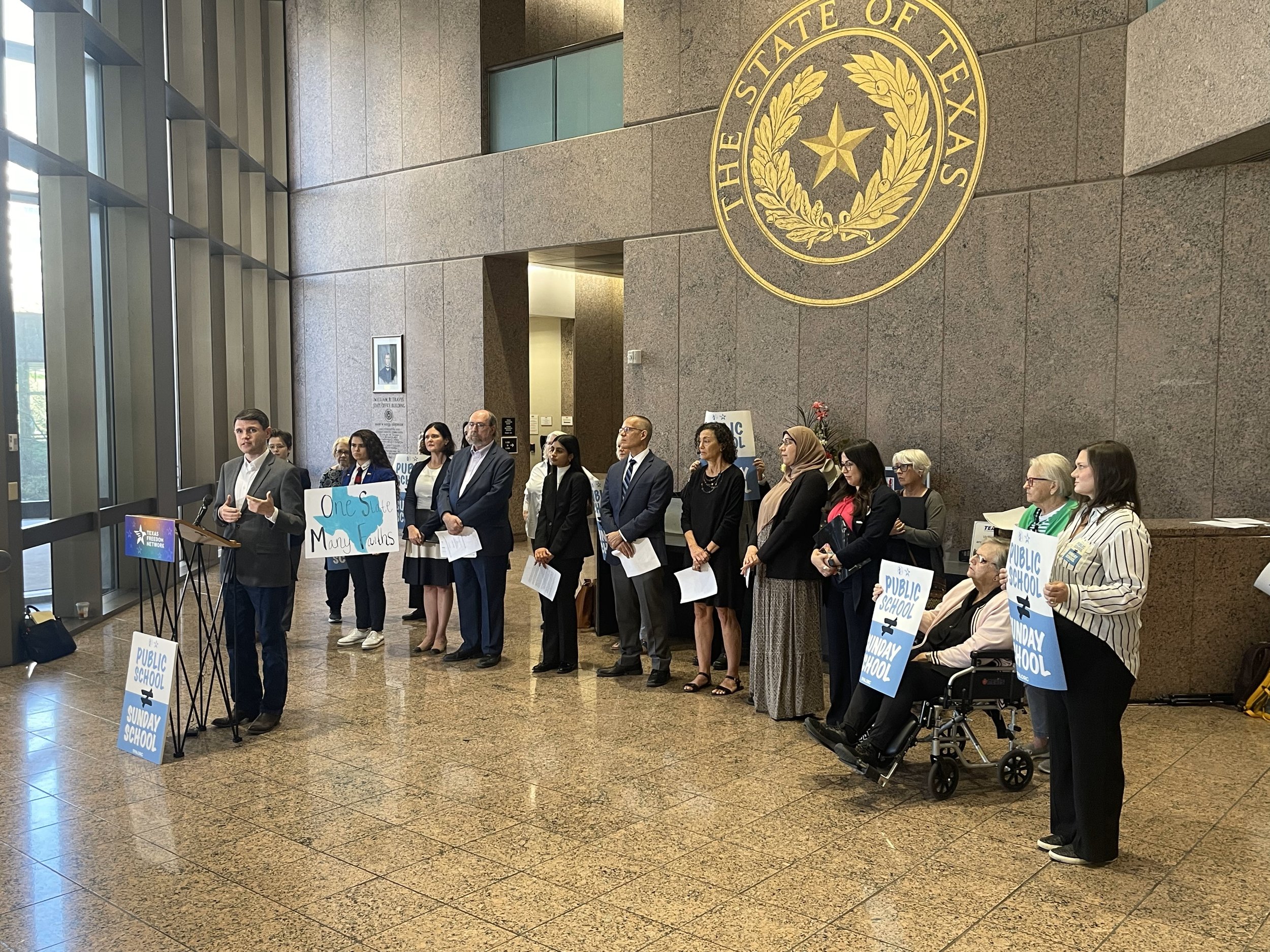
Advocacy resources
Interested in advocacy? You’re in the right place!
Advocacy is how we take our values to the halls of power - school boards, state legislatures, congressional offices, and more. It means speaking up through petitions, public testimony, or direct contact with elected officials to help shape policy and influence decisions.
Start with your community
Before acting, be sure to anchor your efforts in your community’s needs. What change are you calling for? Who has the power to make it happen? Clarifying your goals and audience strengthens your impact.
Get equipped to act
Once you know your strategy, our tools can help. Below, you'll find practical resources for effective advocacy, such as our companion guides on awareness, local organizing, and more.
Explore the opportunities below to raise your voice, influence change, and bring others with you.
Things you can do
Contact your appointed or elected representatives
When engaging in advocacy, you will often need to contact your elected or appointed representatives in government for certain situations — sometimes by phone, sometimes by email, and sometimes maybe even in person.
-
If you live in one of the 50 states in the United States, you have the following representation in different levels of government:
One member of the U.S. House of Representatives
Two U.S. Senators
One member of your state senate
One member of your state house of representatives (unless you live in Nebraska; that state only has one state legislative body, so you only have a state senator)
And, based on your state or region, you might have other representation on a state or county school board, a city council, and other government bodies. Take a moment to make sure you know who represents you at all levels of government.
If you aren’t sure, you can find out by going to various websites:
Google “Who represents me in the [name of state] [name of government body]” and you should get links you need to find your representative in any system
-
No matter if you are calling the office, writing an email, or meeting with someone in person, it’s important to have a plan.
Click here to download our guide for talking with your representatives.
Reminders:
If you are calling the lawmaker’s office, know that staffers or interns typically pick up calls. Sometimes, an automated message is played and you are directed to leave a message. If picked up, calls typically last only a minute or two, and staffers will ask to know your name, where you are from (to confirm you are a constituent), and what bill or policy you will be referencing and your position on said bill.If you are meeting with a lawmaker in person, you will first need to set up a time with the office in advance — don’t show up unannounced.
Want to take action now? Check out our list of current opportunities to make an impact, including forms to use to quickly contact your representatives.
Host a public demonstration or event
Gathering together can show power in numbers, create community, and call for specific action.
-
Protests are a form of advocacy that draw attention to a specific issue or value. They can attract or engage larger crowds and can be an easier entry point for folks who are less attuned to the work of advocacy. When done thoughtfully, protests fit into the larger strategy for community change and offer clear next steps for those who attend.
Various forms of protests include rallies, marches, boycotts, strikes, sit-ins, and walkouts.
To create a thoughtful framework for organizing a protest, check out this guide from the Freedom Forum.
-
Vigils are a powerful and reflective form of public witness. When part of a broader and longer strategy of community organizing, vigils can build awareness and community while fostering resilient hope.
Unlike rallies or protests that often call for urgent action, vigils create sacred space to honor those harmed by injustice, grieve what was lost, and center the moral and spiritual stakes of the moment. They allow communities to gather in solidarity, often incorporating prayer, song, and storytelling. Vigils can deepen our commitment to advocacy by grounding the work in our values and faith, which are key to faith-rooted organizing. Since vigils are often centered on moral and spiritual values, they signal to decision-makers and the broader public that people of faith are paying attention.
A petition can be a great way to build power and community, bringing many people together on one issue and collective statement.
A petition is simply a formal written appeal to an authority – such as an elected official or organization – and it contains demonstrated support on an issue in the form of signatures.
Petitions can be physical letters with written signatures or they can be created online. They are most effective as an advocacy tool when they make a direct request to a decision-maker to act on an issue while also raising public awareness.
Anyone can create and collect signatures for a petition – you do not need permission to write a letter about something that matters to you and have others join you on it!
Looking for tips on creating a petition? Click here for a guide from the Freedom Forum.
Share your petition with your networks and others who might want to sign their name to it. Once you collect signatures, you can deliver it to the authority. You can also share it publicly – perhaps by posting it on a website or sharing with a news outlet – once it’s been delivered.
Create a petition
You can make a tremendous impact in your community by sharing your perspective in local media outlets. Most newspapers and publications have opportunities to write a first-person column – often called an “op-ed” – or a letter to the editor.
Write a column, op-ed or letter to the editor
-
Often you need a “hook” to get the news outlet interested, and your piece should specifically advocate for a position. The key “hook” for a piece could be as simple as “I’m a Christian against Christian nationalism, and I can define the difference.”
Make sure your op-ed or letter is personal, original to you, written in the first-person and specifically advocates for something, such as an action step, a plea to think about things differently, a reason to implement community-wide change, etc. You will also need to look at the media outlet’s requirements for word length and make sure it’s something exclusive to the outlet.
-
The Op-Ed Project has several resources online, including tips on pitching your op-ed.
Read the Harvard Kennedy School of Government’s guide on how to write an op-ed
The Washington Post ‘s guide to writing an opinion article has helpful tips, no matter the media outlet you have in mind.
If you write an op-ed or letter to the editor, we’d love to celebrate it with you! Contact us to let us know!




